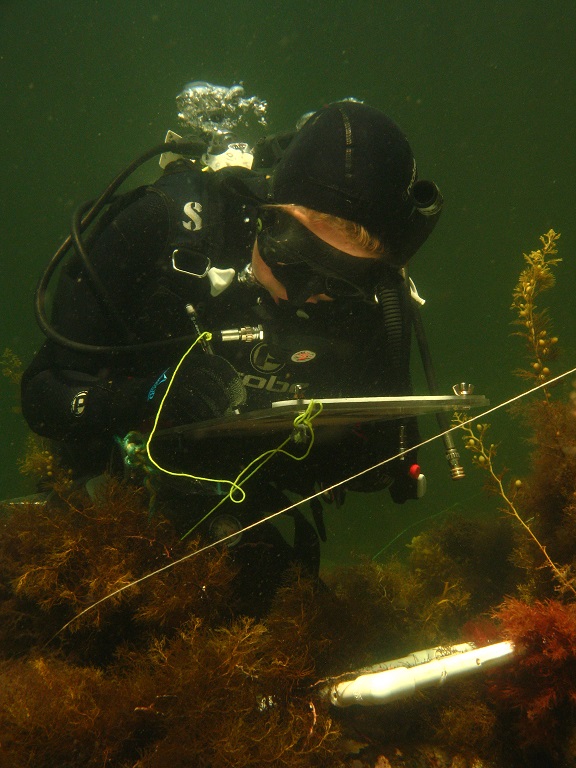
In case you missed it, here's what we’ve been up to in August - and the successes we're celebrating...
A new partnership between the Derwent Estuary Program and IMAS will benefit our researchers and students - and Hobart’s iconic waterway.
The DEP and IMAS have formalised our longstanding relationship, which focuses on improving the health of the Derwent, and will make a real difference to our local environment and community here in Tasmania.
The Derwent is right on our doorstep, so there'll be fantastic place-based learning opportunities for our IMAS University of Tasmania students.
Having student and IMAS research projects conducted in the local community is a great way to connect our science to the community, and the community to IMAS.
Read more – and meet some good, bad and weird creatures of the Derwent, photographed by our scientists and students.
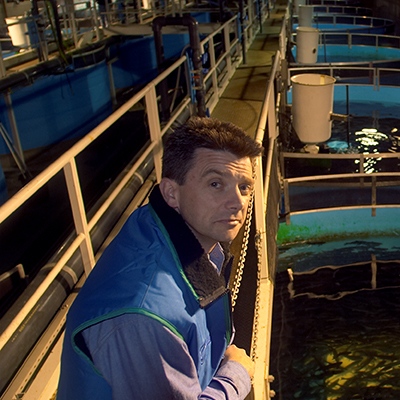 NEW PHD SCHOLARSHIP HONOURS
NEW PHD SCHOLARSHIP HONOURS A new University of Tasmania PhD scholarship honouring Tasmanian aquaculture biologist Dr Harry King, who lost his battle with prostate cancer in 2019, will guide the next generation of aquaculture researchers.
The scholarships will continue Harry’s legacy of doing world-leading applied science, to advance our knowledge about salmon and contribute to sustainable aquaculture.
“Harry was passionate about science and the positive impact it can have on industry practice. His diligence... to realise these connections was outstanding,” CSIRO’s Dr Mat Cook said.
The Harry King Scholarship will be funded by the University and CSIRO, jointly supervised by IMAS and CSIRO, and will include an industry work placement. Read more
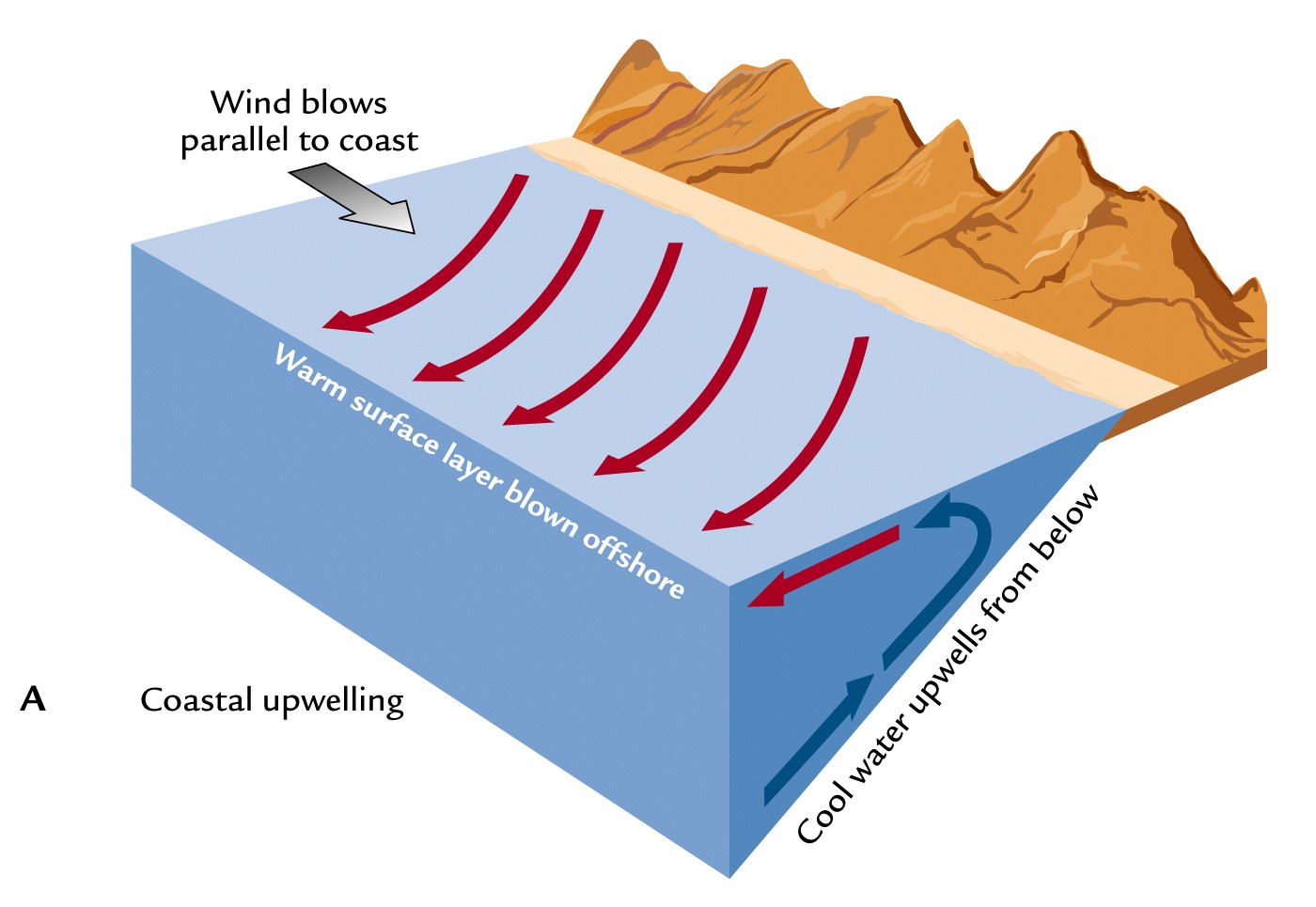 Oceanic fronts can influence coastal marine ecosystems and plankton communities, concentrate pollutants and plastics, and even affect the behaviour of endangered and migratory species.
Oceanic fronts can influence coastal marine ecosystems and plankton communities, concentrate pollutants and plastics, and even affect the behaviour of endangered and migratory species.
Fronts are the boundaries between distinct water masses and areas of biological productivity that enhance turbulent mixing and upwelling.
IMAS and Vietnam National University scientists have studied the trends in the upwelling area off south-central Vietnam to find out whether oceanic fronts increased over the last 16 years, and if this is related to changing ocean temperatures.
They identified two front types within the system – shelf break fronts and upwelling fronts – and found frontal frequency is strongly influenced by seasonal monsoons. Shelf break fronts are likely to increase as temperatures rise, while upwelling fronts seem to be moderated by El Niño events.
The research shows climate change and ocean warming will have localised effects that depend on landform (geomorphic) features and local coastal processes like upwelling dynamics.
The study was published in the Journal of Marine Systems
Image shows how upwelling occurs along a coastline (IMAS)
SEIZE THE DAY: EARLY-CAREER RESEARCHERS ON PATHWAY TO SUCCESS
Three University of Tasmania researchers are among 196 recipients of the 2022 Australian Research Council Discovery Early Career Researcher Awards (DECRA).
The University has been awarded a total of $1,324,711 in the current DECRA round, a scheme that enhances the scale and focus of research in Australian Government priority areas, while supporting excellent basic and applied research by early career researchers.
“The DECRA scheme provides our promising early career researchers the opportunities and resources to advance their research and build diverse career pathways,” ARC Chief Executive Officer, Professor Sue Thomas said.
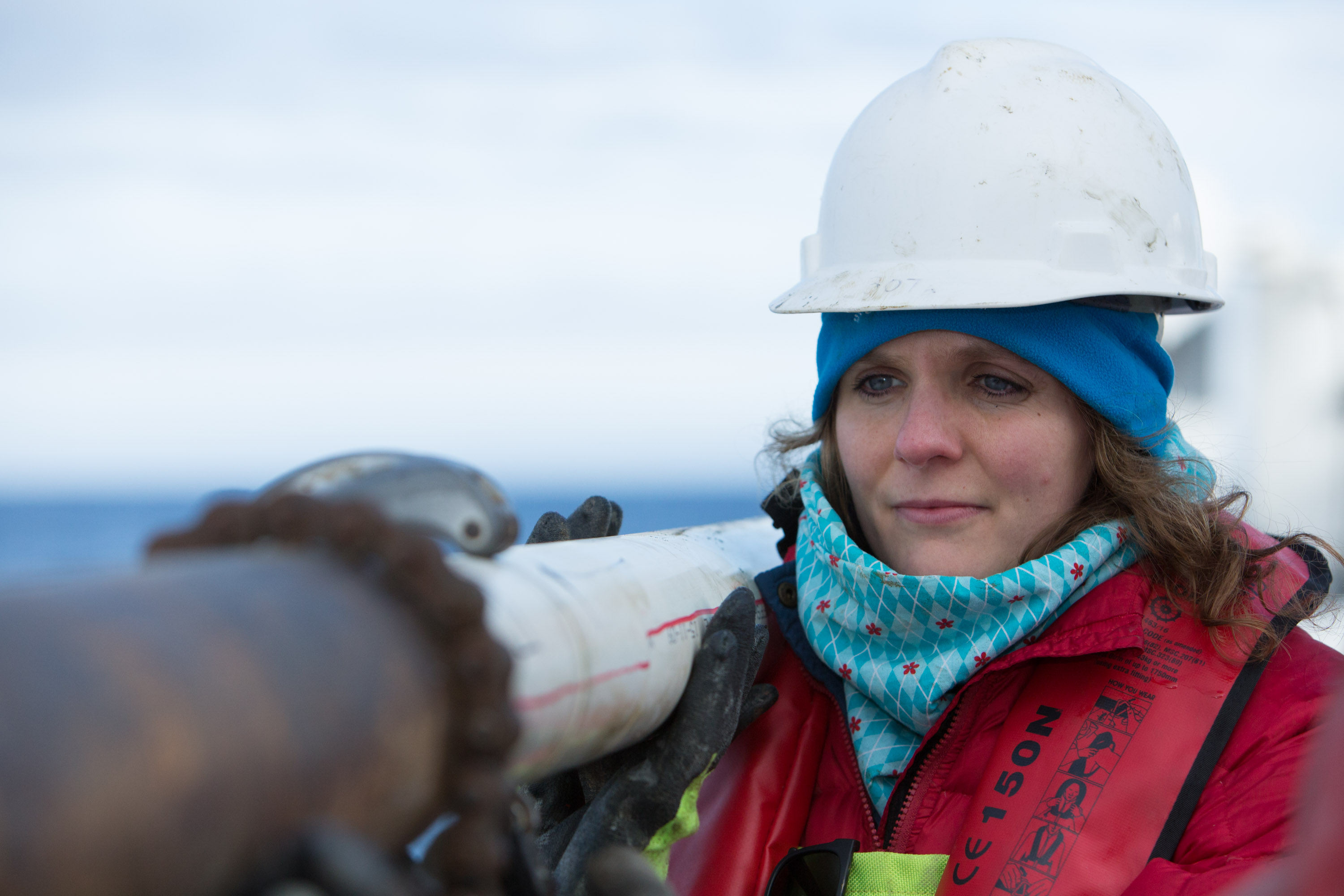 IMAS researcher Dr Taryn Noble (pictured) will be assessing the vulnerability of East Antarctica to future warming. The project will address major gaps in our understanding of how the Antarctic Ice Sheet will respond to climate change, through critical insights into its sensitivity to past climate warming.
IMAS researcher Dr Taryn Noble (pictured) will be assessing the vulnerability of East Antarctica to future warming. The project will address major gaps in our understanding of how the Antarctic Ice Sheet will respond to climate change, through critical insights into its sensitivity to past climate warming.
“I’ll be applying geochemical approaches to track meltwater input due to ice-sheet loss during past warming, and the impact of glacial meltwater on biological productivity and Southern Ocean circulation,” Dr Noble said.
“Knowing how the ice sheet and ocean respond to climate warming will lead to more reliable long-term projections of future sea-level rise and climate – and it will facilitate evidence-based policy decisions for managing the impact of sea-level rise.”
Meanwhile, ICT researcher Dr Zehong (Jimmy) Cao will be working on a closed-loop human–agent learning framework to enhance decision making, and CALE researcher Dr Susan Bartie will develop a socio-legal history of Australia's environmental lawyers with the aim of creating new resources to benefit the environment and the community. Read more… (Photo: Doug Thost)
OUTSTANDING MID-CAREER SCIENTISTS TO CONDUCT RESEARCH FOR THE BENEFIT OF AUSTRALIA
Two IMAS University of Tasmania researchers are among 100 recipients of Australian Government funding under the ARC Future Fellowships scheme this year. The grants are awarded for research in areas of critical national importance, with a focus on finding solutions for key industry challenges and training the next generation of researchers.
IMAS Professor Julia Blanchard has received an ARC Future Fellow grant for her project to bridge the land-sea divide to ensure food security under climate change.
The project is set to deliver a major leap in our capacity to undertake holistic ecosystem assessment of future food production pathways, with benefits that include integrated food-biodiversity-climate policies for Australia and the world.
IMAS Adjunct Senior Lecturer Dr Simon Williams has received an ARC Future Fellow grant for his project on the Earth’s magnetic field as an invaluable resource for studying the structure and dynamics of our planet.
This project will uncover the dominant sources of magnetization close to Earth's surface, using next-generation satellite data and recent theoretical advances. It will address both economic and environmental issues, unravelling the nature of structures that control both mineral systems and heat flow variations beneath the Antarctic ice sheet.
Australian Research Council (ARC) CEO Professor Sue Thomas welcomed the $93 million in funding for the new Future Fellows for 2021, and said the Fellowships scheme is designed to attract and retain the best and brightest mid-career researchers.
“These new Future Fellowships are awarded to outstanding mid-career researchers, who will receive funding support for the next four years to undertake their innovative research in Australia,” Professor Thomas said.
| 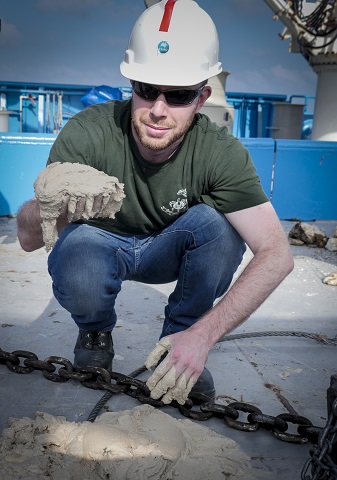 Dr Simon Williams Dr Simon Williams |
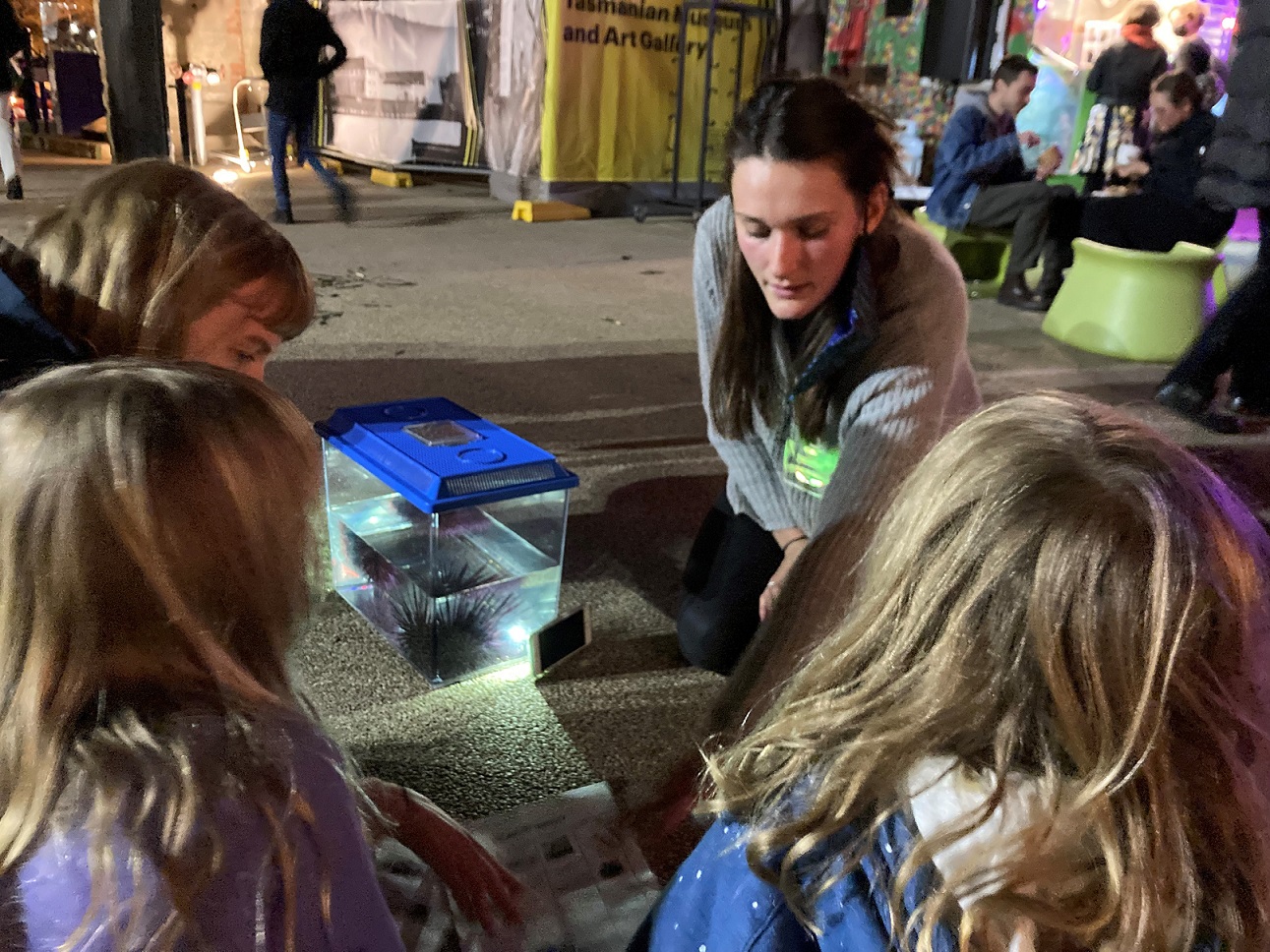 TAKING SCIENCE TO THE STREETS
TAKING SCIENCE TO THE STREETSOur scientists and students have been taking our science to the streets – and out on the water – this month as part of the Beaker Street Festival and National Science Week.
Our Urchin Exhibition was finally open to the public as part of the Beaker Street Festival’s sci-art crawl, a self-guided science-focused walking tour around Hobart.
Approximately 100 people came through the exhibition, with our roving scientists Dr John Keane, Assoc Prof Scott Ling (below left), and PhD student Jennifer Smith (right) on hand to talk about when Long-spined sea urchins first arrived in Tasmania, how science, government, industry and community are working to deal with the urchin invasion!
We were also at the Beaker Street Festival’s popular Roving Scientist Bar and the IMAS and Menzies-sponsored Microscopy & Oddities Station. Meanwhile, Prof Gretta Pecl and Prof Catriona Macleod took part in the festival’s Tassie Road Trip, talking about their research on Wineglass Bay and Gordon River cruises.
On the Festival’s opening night, our Adrift Lab researcher Dr Jennifer Lavers and PhD students Megan Grant and Lillian Stewart were joined by artist Lucienne Rickard in a Science Unfiltered session – an honest conversation about what it's like working on the frontlines of a rapidly changing world.
In the Hobart Underground during Science Week, our Marine Predator Lab held an exhibition – an immersive, art-science fusion all about marine predators and the research happening in Tasmania.
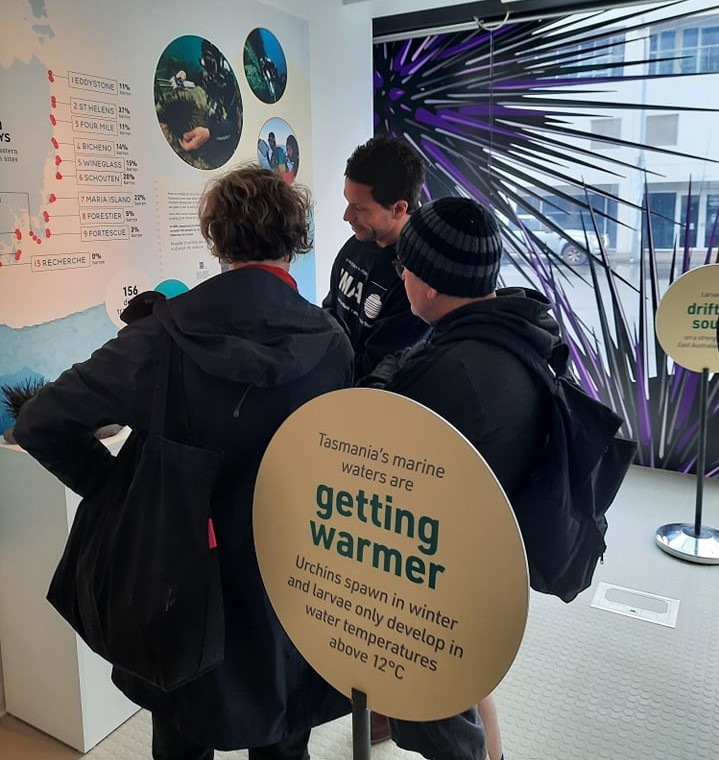 | 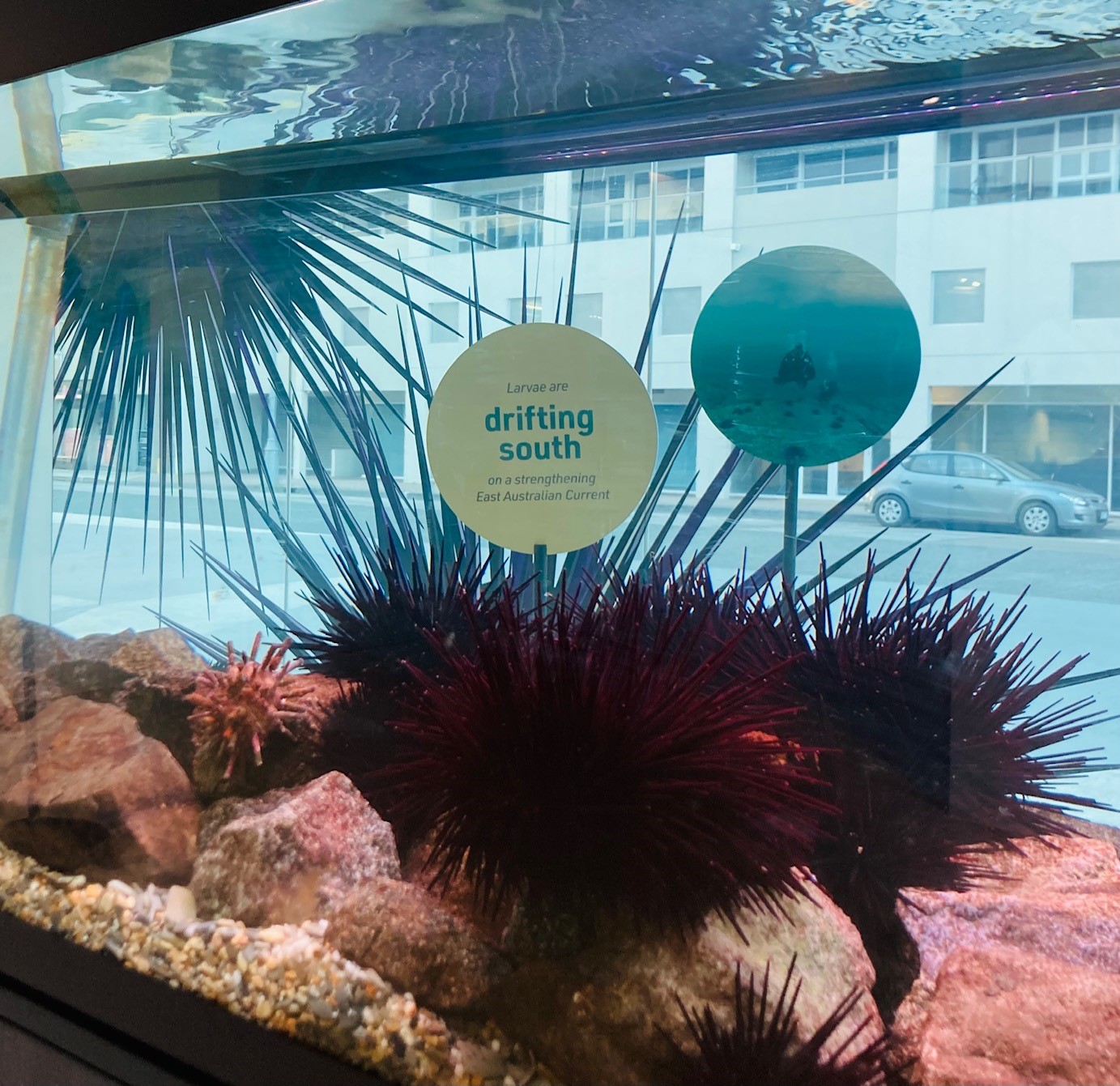 |
Don’t miss a thing – follow us on Facebook, Twitter and Instagram.
Published 3 September 2021